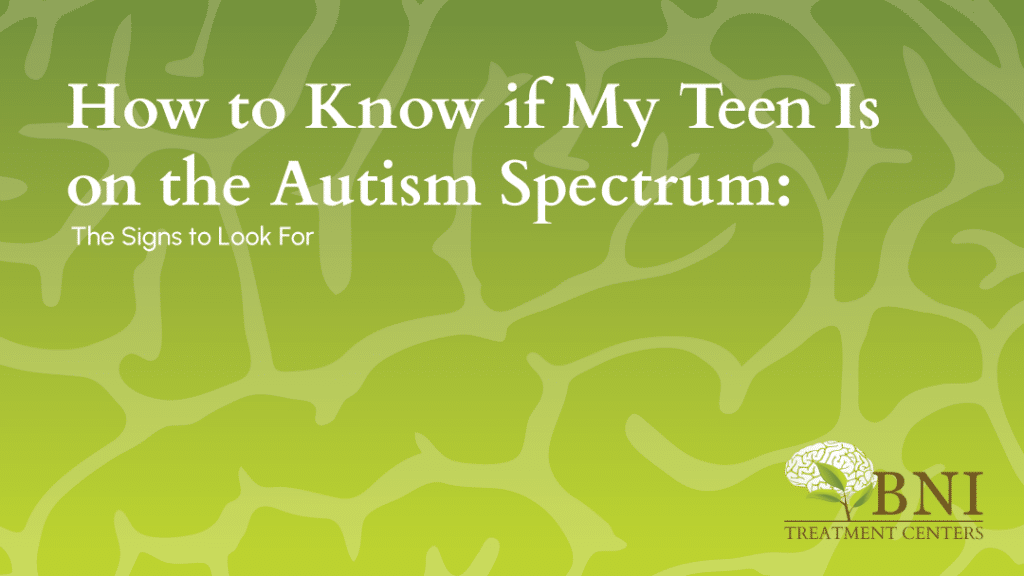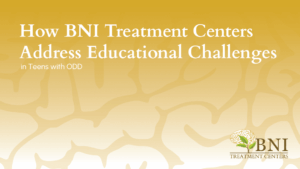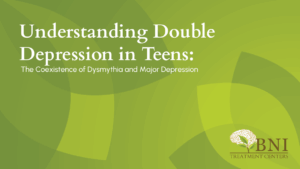
As many as 1 in 29 youth have autism spectrum disorder (ASD). The real number may be greater than that. One study found that 1 in 4 16-year-olds with ASD lacked an official diagnosis before the study.
Is your teen one of them? If you searched “how to know if my teen is on the autism spectrum” and found yourself here, you’re in the right place.
BNI Treatment Centers works with adolescents with a multitude of conditions, including ASD. We’ll provide guidance on what it looks like, and how to recognize it in your teen.
Is Your Teen on the Autism Spectrum? Here Are Some Signs You May Have Missed
It’s important to know that you cannot develop ASD later in life. Signs of autism are evident at a very early age, though they may appear to “worsen” during adolescence. This is due to the changes happening at this stage in the teen’s life, not any physiological changes caused by ASD.
Adolescence comes with new obstacles and opportunities for growth. Individuals with ASD rarely react well to change, so this fact alone can complicate matters during the teenage years. These signs could also indicate your teen is on the autism spectrum:
- Black-and-white thinking
- Extreme reactions to disruptions to their routines
- Misinterpreting social cues and conversations
- Poor eye contact
- Difficulties “fitting in” and forming in-person relationships
- Touch sensitivity
- Becoming overwhelmed by noisy areas
- Trouble understanding and expressing their emotions
- Anxiety
- Seizures
- Difficulty in school

Risk Factors for Autism in Teens: What Causes ASD?
ASD is caused by a combination of genetic and environmental factors.
The heritability of ASD is between 80% and 90%, making the genetic component significant. Studies have shown that there are multiple risk genes, not one specific gene responsible for the condition. Some genetic mutations that contribute to ASD also occur spontaneously and aren’t inherited.
Evidence shows that maternal smoking and vaccinations do not cause autism. However, these environmental factors might contribute to ASD’s development, and its presence in teens by extension:
- Parents being older
- Birth complications such as ischemia (lack of blood flow) and hypoxia (low oxygen)
- Maternal obesity
- Maternal diabetes
- Being born via caesarian section
- Being born prematurely
- Vitamin D deficiency
- The presence of inorganic mercury and lead
- Air pollution
We are not exactly sure how these environmental factors contribute to ASD from a scientific standpoint yet. We just know there is a consistent correlation.
Because autism is something children are born with, the risk factors are the same for teens as any other child. It’s possible for youth with high-functioning autism to mask their symptoms well enough not to receive an autism diagnosis early in life. These symptoms might become more obvious in adolescence due to puberty, increased stress, and other life changes involved in growing up.
What to Do if You Suspect Your Teen Is on the Autism Spectrum: The Most Important Step
If you suspect your teen is on the autism spectrum but they do not have a diagnosis yet, taking them to a mental health professional is vital. While ASD is not a condition to “cure,” autism treatment can provide these adolescents with strategies to manage ASD and live fulfilling, functional lives. While it’s ideal to start some form of treatment earlier in childhood, it is certainly still effective and important for adolescents as they approach adulthood.
How Does Someone Receive a Teen Autism Diagnosis?
There is no medical test that determines ASD. Instead, diagnoses are made based primarily on observation. Symptoms of ASD can also vary greatly and overlap with other mental health conditions. This makes diagnosis complicated. However, the Diagnostic and Statistical Manual, Fifth Edition (DSM-5) provides criteria practitioners frequently use.
To receive a diagnosis of ASD, teens must exhibit the following behaviors:
- Difficulty socializing, such as not being able to hold a normal conversation, not sharing interests and emotions, or not initiating and responding to conversations
- Deficits in communication behaviors, such as confused body language, poor eye contact, lack of gestures, lack of facial expression, or being nonverbal
- Trouble with relationships, such as an inability to adjust to proper social contexts, not playing with or being interested in others, and not making friends
They also must display two of the following four attributes:
- Repetitive motor movements, speech, or use of objects
- Inflexibility and irrational insistence on sticking to a routine
- Extreme fixation on a specific area of interest
- Sensory concerns, such as light, touch, and sound sensitivity, indifference to pain or temperature, or a fascination with sensory aspects of the environment
These symptoms must be present in early childhood, significantly impact the way the teen functions, and not be attributed to another condition.

Finding Autism Treatment in the Los Angeles Area
Managing autism during the teenage years is challenging and can be painful for adolescents. Thankfully, help is available. Your teen can still learn how to live a happy, healthy life with ASD, even if they aren’t diagnosed until adolescence.
BNI Treatment Centers focuses on mental health care for youth ages 12-17. Our expert clinicians work closely with teens with a variety of highly complex conditions.Our skilled teams are well-equipped to assist teens with ASD and co-occurring conditions, and we treat every aspect of their psychological health. Psychiatrists are intimately involved in every adolescent’s treatment, ensuring it is effective and that they receive medication if needed. Call us at (888) 522-1504 to learn how we can help your teen.
BNI Treatment Centers: Science-based, evidence-backed, compassion-led.




